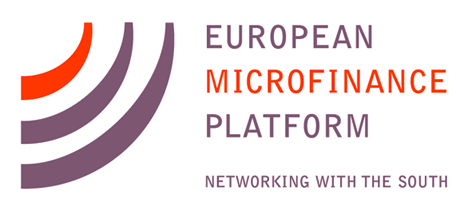During today’s opening sessions of European Microfinance Week, e-MFP’s Investor Action Group met to discuss social performance measurement within microfinance institutions (MFIs). Calum Scott of US-based NGO Opportunity International described his organization’s efforts to work with MFIs to measure client outcomes. He specified that Opportunity generally does not seek to measure client impact, as that has proven too resource-intensive for its purposes. However, he argued that, “The pandemic doesn’t make outcomes data less important. If anything it makes it more important to know if and how your products are helping clients.” Of Opportunity’s partners, 95 percent use SPI4 to report quarterly data to both Opportunity and France-based Comité d’Echange, de Réflexion et sur les Systèmes d’Epargne-Crédit (CERISE).
today’s opening sessions of European Microfinance Week, e-MFP’s Investor Action Group met to discuss social performance measurement within microfinance institutions (MFIs). Calum Scott of US-based NGO Opportunity International described his organization’s efforts to work with MFIs to measure client outcomes. He specified that Opportunity generally does not seek to measure client impact, as that has proven too resource-intensive for its purposes. However, he argued that, “The pandemic doesn’t make outcomes data less important. If anything it makes it more important to know if and how your products are helping clients.” Of Opportunity’s partners, 95 percent use SPI4 to report quarterly data to both Opportunity and France-based Comité d’Echange, de Réflexion et sur les Systèmes d’Epargne-Crédit (CERISE).
Paul Thomas of India’s ESAF Small Finance Bank, whose investors include Opportunity, described his organization’s collection of data on client outcomes. For example, “barefoot counselors” gather data door-to-door using tools such as SPI4 and PPI. ESAF has found this work helpful to improve existing products and also to develop new ones that are more customer-centric, giving the bank an advantage over its competitors. These products include different debit cards designed for youth and farmers as well as loans for clean-energy products and disaster recovery, including recovery from the COVID-19 pandemic. Mr Thomas also hopes that outcomes data will help the bank to attract funding from more impact investors, although this has not been the case to date.
Marilou Juanito of the Netherlands’ Oikocredit, which has also invested in ESAF, described a 5-day workshop format Oikocredit uses to help MFI staff develop measurement processes that meet their needs. She starts participants’ thinking with questions such as, “Are women clients poorer than male clients?” and “Do urban borrowers move out of poverty more or less than rural borrowers?”. The participants leave the workshop with action plans that include steps such as integrating social and financial reporting, cleaning data regularly, and updating a dashboard each month to simplify monitoring.
Kawien Ziedses des Plantes of Oikocredit explained that, “We underestimated the amount of time that would be needed” for certain parts of the workshops. This includes to boost participants’ practical skills (eg using spreadsheet software) and analytical skills (eg understanding what data in a spreadsheet is most important). Still, “They were just delighted to learn on the spot, working with real data from their own systems.… It really pays off in terms of engagement and empowerment.” Each group includes about 10 people from a single MFI, including staff of different levels of the organization. “When you decide as a group what data to report and to whom, then it becomes part of the organization – embedded structurally.… For us it was key to have sign-off from the management team.”
Regarding data collection, Cécile Lapenu of CERISE stressed the importance of setting reasonable goals for field staff. She cited instances in which overburdened staff have falsified data to make customers seem more poor or simply fabricated data to save time.
Circling back to the incentives for an organization to collect data, Ms des Plantes noted, “If a product meets the needs of clients, there will be more take-up of that product.”
Jurgen Hammer of the US-based nonprofit Social Performance Task Force asked, “Are investors doing enough to incentivize MFIs to do this work?” Although Oikocredit does offer lower interest rates for loans to MFIs showing “exceptional social performance,” Ms des Plantes said that MFIs are not getting the message that investors believe this is deeply important.
This feature is part of a sponsored series on European Microfinance Week 2020, which is taking place online through November 20. The event is held annually by e-MFP. MicroCapital has been engaged to promote and report on the conference each year since 2012.
Additional Resources
European Microfinance Platform (e-MFP) information on European Microfinance Week 2020
http://www.e-mfp.eu/european-microfinance-week-2020
MicroCapital coverage since 2012 of European Microfinance Week, including each European Microfinance Award
https://www.microcapital.org/category/european-microfinance-week/
Similar Posts:
- SPECIAL REPORT: European Microfinance Week 2023 Opens With Action Group Meetings, Including Investors Sharing Strategies for Measuring Social Performance #EMW2023
- SPECIAL REPORT: The Business Case for Education Finance #EMW2023
- SPECIAL REPORT: Yikri of Burkina Faso Wins $110k European Microfinance Award for Progress Toward Food Security #EMW2023
- SPECIAL REPORT: Digitizing Microfinance to Meet Customer Needs via an Incremental Approach #EMW2023
- SPECIAL REPORT: Investors, MFIs Continue to Wrestle with Sustainable Finance Disclosures Regulation (SFDR) #EMW2023
